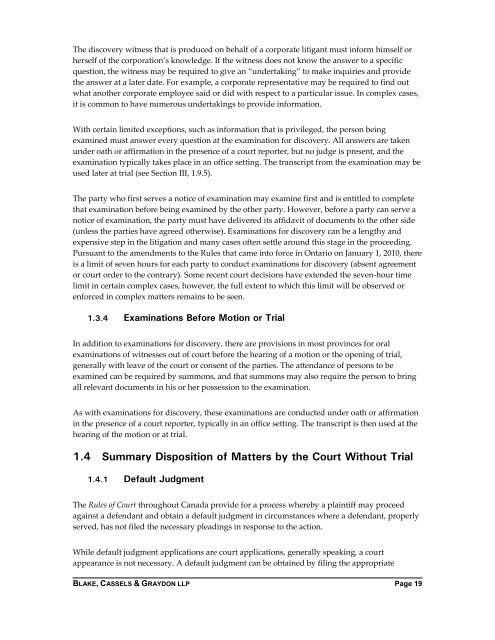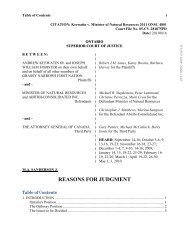Litigation and Dispute Resolution Guide
Litigation and Dispute Resolution Guide
Litigation and Dispute Resolution Guide
Create successful ePaper yourself
Turn your PDF publications into a flip-book with our unique Google optimized e-Paper software.
The discovery witness that is produced on behalf of a corporate litigant must inform himself orherself of the corporation’s knowledge. If the witness does not know the answer to a specificquestion, the witness may be required to give an “undertaking” to make inquiries <strong>and</strong> providethe answer at a later date. For example, a corporate representative may be required to find outwhat another corporate employee said or did with respect to a particular issue. In complex cases,it is common to have numerous undertakings to provide information.With certain limited exceptions, such as information that is privileged, the person beingexamined must answer every question at the examination for discovery. All answers are takenunder oath or affirmation in the presence of a court reporter, but no judge is present, <strong>and</strong> theexamination typically takes place in an office setting. The transcript from the examination may beused later at trial (see Section III, 1.9.5).The party who first serves a notice of examination may examine first <strong>and</strong> is entitled to completethat examination before being examined by the other party. However, before a party can serve anotice of examination, the party must have delivered its affidavit of documents to the other side(unless the parties have agreed otherwise). Examinations for discovery can be a lengthy <strong>and</strong>expensive step in the litigation <strong>and</strong> many cases often settle around this stage in the proceeding.Pursuant to the amendments to the Rules that came into force in Ontario on January 1, 2010, thereis a limit of seven hours for each party to conduct examinations for discovery (absent agreementor court order to the contrary). Some recent court decisions have extended the seven-hour timelimit in certain complex cases, however, the full extent to which this limit will be observed orenforced in complex matters remains to be seen.1.3.4 Examinations Before Motion or TrialIn addition to examinations for discovery, there are provisions in most provinces for oralexaminations of witnesses out of court before the hearing of a motion or the opening of trial,generally with leave of the court or consent of the parties. The attendance of persons to beexamined can be required by summons, <strong>and</strong> that summons may also require the person to bringall relevant documents in his or her possession to the examination.As with examinations for discovery, these examinations are conducted under oath or affirmationin the presence of a court reporter, typically in an office setting. The transcript is then used at thehearing of the motion or at trial.1.4 Summary Disposition of Matters by the Court Without Trial1.4.1 Default JudgmentThe Rules of Court throughout Canada provide for a process whereby a plaintiff may proceedagainst a defendant <strong>and</strong> obtain a default judgment in circumstances where a defendant, properlyserved, has not filed the necessary pleadings in response to the action.While default judgment applications are court applications, generally speaking, a courtappearance is not necessary. A default judgment can be obtained by filing the appropriateBLAKE, CASSELS & GRAYDON LLP Page 19
















